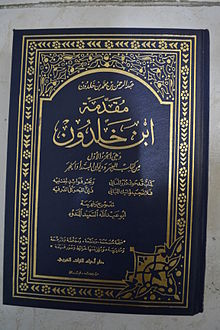
Back مقدمة ابن خلدون Arabic Müqəddimə (İbn Xəldun) Azerbaijani মুকাদ্দিমা Bengali/Bangla Mukadima BS Muqaddimah Catalan Mukadimaho Esperanto Muqaddima Spanish Muqaddimah Estonian Muqaddimah Basque مقدمه ابن خلدون Persian
 | |
| Author | Ibn Khaldun |
|---|---|
| Original title | مقدّمة ابن خلدون |
| Language | Arabic |
| Published | 1377 |
| Text | Muqaddimah at Wikisource |
The Muqaddimah (Arabic: مقدّمة "Introduction"), also known as the Muqaddimah of Ibn Khaldun (Arabic: مقدّمة ابن خلدون) or Ibn Khaldun's Prolegomena (Ancient Greek: Προλεγόμενα), is a book written by the historian Ibn Khaldun in 1377 which presents a view of universal history.[1] Some modern thinkers view it as the first work dealing with the social sciences of sociology,[2][3] demography,[citation needed] and cultural history.[4] The Muqaddimah also deals with Islamic theology, historiography,[5] the philosophy of history,[2] economics,[6][7] political theory, and ecology.[8][9] It has also been described as a precursor or an early representative of social Darwinism,[10] and Darwinism.[clarification needed][11]
Ibn Khaldun wrote the work in 1377 as the introduction and the first book of his planned work of world history, the Kitab al-ʿIbar ("Book of Lessons"; full title: Kitābu l-ʻibari wa Dīwāni l-Mubtada' wal-Ḥabar fī ayāmi l-ʻarab wal-ʿajam wal-barbar, waman ʻĀsarahum min Dhawī sh-Shalṭāni l-Akbār, i.e.: "Book of Lessons, Record of Beginnings and Events in the history of the Arabs and Foreigners and Berbers and their Powerful Contemporaries"), but already in his lifetime it became regarded as an independent work on its own.
- ^ Ruud, Jay (2014). "The Muqaddimah". Encyclopedia of medieval literature (2nd ed.). New York. ISBN 978-1-4381-4974-5. OCLC 974769342.
{{cite book}}: CS1 maint: location missing publisher (link) - ^ a b Akhtar 1997.
- ^ Alatas, S. H. (2006), "The Autonomous, the Universal and the Future of Sociology", Current Sociology, 54: 7–23 [15], doi:10.1177/0011392106058831, S2CID 144226604
- ^ Mohamad Abdalla (Summer 2007. "Ibn Khaldun on the Fate of Islamic Science after the 11th Century", Islam & Science 5 (1), p. 61-70.
- ^ Warren E. Gates (July–September 1967), "The Spread of Ibn Khaldun's Ideas on Climate and Culture", Journal of the History of Ideas, 28 (3): 415–422, doi:10.2307/2708627, JSTOR 2708627
- ^ I. M. Oweiss (1988), "Ibn Khaldun, the Father of Economics", Arab Civilization: Challenges and Responses, New York University Press, ISBN 0-88706-698-4.
- ^ Jean David C. Boulakia (1971), "Ibn Khaldun: A Fourteenth-Century Economist", The Journal of Political Economy 79 (5): 1105–1118.
- ^ Ahmad, A. (3 July 2013). New Age Globalization: Meaning and Metaphors. Springer. ISBN 9781137319494. Retrieved 25 February 2017 – via Google Books.
- ^ Wallace 2009, p. 303.
- ^ Baali, Fuad (1 January 1988). Society, State, and Urbanism: Ibn Khaldun's Sociological Thought. SUNY Press. ISBN 9780887066092. Retrieved 25 February 2017 – via Google Books.
- ^ Leuprecht 2011, p. 64.